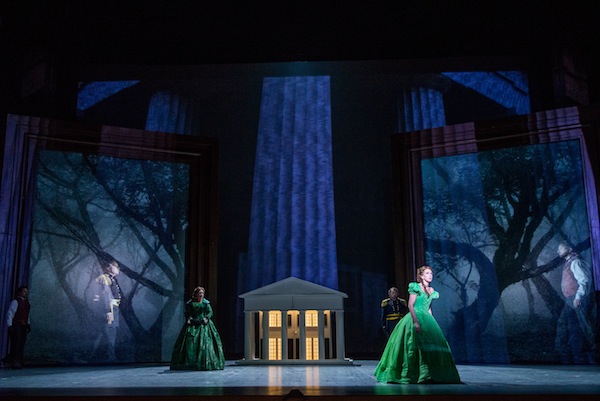
Love that kills: Mourning Becomes Electra at FGO
By Sebastian Spreng, Visual Artist and Classical Music Writer
The columns frame neither a Greek palace nor an antebellum mansion, but a dollhouse. A more intricate dollhouse than Henrik Ibsen’s, but nevertheless a dollhouse – and a tomb as well – lies at the heart of the production of Mourning Becomes Electra with which the Florida Grand Opera opens its 2013-14 season. Its source, the Eugene O’Neill’s homonymous play, was immortalized by actresses of the stature of Dame Judith Anderson and Colleen Dewhurst and adapted into a film starring Rosalind Russell, Michael Redgrave, Kirk Douglas and the mythical Katina Paxinou as Christine (the stand-in for Clytemnestra).
O’Neill’s extremely original version of Aeschylus’ Oresteia – a trilogy comprising Agamemnon, The Libation Bearers and The Eumenides – shifted the action from the aftermath of the Trojan war to that of the American Civil War and inspired Henry Butler’s outstanding libretto for Marvin David Levy’s opera, the second world premiere that a fledgling Metropolitan Opera staged in the course of its first season, in 1967. It was a resounding success that overshadowed the unfortunate premiere, months earlier, of Samuel Barber’s Antony and Cleopatra at the inauguration of the Lincoln Center’s opera hall. The Met’s production boasted a formidable team, with Cypriot Michael Cacoyannis (Zorba the Greek, The Trojan Women and Electra, a film starring Irene Papas) at the helm, Zubin Mehta at the podium, and, onstage, Sherrill Milnes, the late Marie Collier and Evelyn Lear, who, already famous in Europe, made her U.S. debut, and achieved acclaim, in the role of Lavinia (Electra).
Nevertheless, as if afflicted with the curse of the House of Atreus (here named Mannon), the opera’s initial success was followed by three decades of virtual oblivion. Revised by the author, a revival was staged in Chicago in 1998 and others in Seattle and New York in 2003. A decade later, it makes its South Florida debut, opening a new chapter in the Florida Grand Opera’s 73-year history and honoring the octogenarian composer, a resident of Fort Lauderdale, where it opened a week earlier than in Miami.
The choice of this work is another sign of Susan Danis’ commitment to modernity in her first season at the head of the FGO, a role in which she is taking on challenges that the company and the public sorely need. It’s a healthy adventure, definitely healthier than the dysfunctional Mannon family, beset as it is by ghosts, wars, ancestral hatreds and parallel complexes, such as Electra’s (love of her father) and Oedipus’ (love of his mother), all twisted into a spider’s web impregnated with ancient Puritanism, the makings of a sumptuous feast for Sigmund Freud.
Homecoming, The Hunted and The Haunted (the three plays in O’Neill’s own trilogy) emerge from the dollhouse that the child Electra opens to display her world, revealing the family horrors, the legacy of a war, its dead, its living dead and the never-healing wounds that every conflict leaves behind, especially on an already troubled dynasty. The zealously guarded doors open to allow the drama to burst through like a gust of wind, until, inexorably, they slam shut, imprisoning the protagonist, burying her alive with her dead, the dead she so loves, so hates.
This authentic American Gothic of Greek roots calls for a production that brings together its traditional and modern aspects, both visual and musical. In contrast to the torrential Strauss’ Elektra, Levy’s score underlines, annotates and references – with scalpel-like precision – O’Neill’s drama, giving it, at times, a cinematic treatment. Ken Newbury’s stage direction, aided by Anya Klepikov’s sets, Robert Wierzel’s lighting, Wendall Harrington’s spectacular projections and Elizabeth Caitlin Ward’s period costumes, accomplishes the goal of combining the two styles while remaining faithful to the essence of the play. The visuals are the the crux of the production’s success, the link between the orchestra pit and the stage.
Once again, Valencia native Ramón Tebar delivers an amazing performance, this time conducting the work of a contemporary author and drawing exceptional sounds from the orchestra: crystalline, subtle or thundering, according to the demands of Levy’s complex, intricate score. Without a doubt, the FGO’s musical director and his orchestra have passed this difficult test with flying colors.
Onstage a solid cast, headed by veteran Lauren Flanigan, repeating her much-praised portrayal of Christine in Chicago, Seattle and New York. Barely a notch below her, Rayanne Dupuis’ Lavinia, a winner thanks to her conviction and honesty, manages dramatic tension with the same passion and devotion as her onstage antagonist, her mother’s child through and through. Among the two women’s impeccable male counterparts, a fantastic Morgan Smith as Adam Brant (Aegisthus), the eye of the hurricane, Keith Phares as Orin (Orestes) and Kevin Langan as a faultless Gen. Ezra Mannon (Agamemnon) all stand out. The necessary breath of fresh air is provided by Thomas Lehman (Peter/Pylades) and Riley Svatos (Helen), playing the young couple delivered, in the nick of time, from the clutches of the Mannons.
The FGO’s is an exemplary neoclassical production of a neoclassical opera, a staging that treats burning issues with reserved coolness and delivers a first-class version that holds its own vis-à-vis its illustrious predecessors. Like the ghosts of the house of Mannon, this Mourning Becomes Electra lingers, drifting about in the audience’s unconscious until docking at a harbor that is opera and, also, great theater. It is now the task – and privilege – of Miamians to see that for themselves.

Nov. 16-23, Adrianne Arsht Center, Miami, www.fgo.org or 1-800-741-1010.
Recent Content
-
Artsarticle ·
-
Artsarticle ·
-
Artsarticle ·

